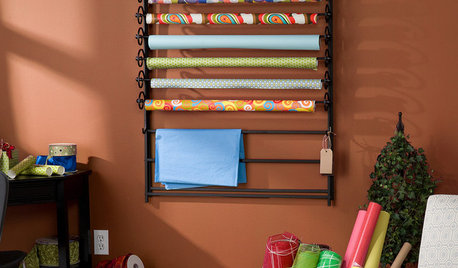Supply/distribution center vs big box store
Jessica G
8 years ago
last modified: 8 years ago
Featured Answer
Sort by:Oldest
Comments (44)
greg_2015
8 years agolast modified: 8 years agoRelated Discussions
How is plant quality from 'big box' stores
Comments (28)Mxk3, I fully understand your point. I'd spend MORE at the locally-owned nurseries in my area if they got plants in earlier. I live in a "banana belt" in my area--my zip code runs from hardiness Zone 7 (my neighborhood) to hardiness zone 5 less than 5 miles away. That's true of the entire Reno-Sparks area. The result is that I want cold-hardy annuals like pansies and snapdragons far earlier than most gardeners in this town because I *can* plant and enjoy them earlier in the year. Locally-owned nurseries, quite sensibly, don't carry them that early. They bring the plants in once most gardeners in the area can safely plant them out. That's a full month later than I can. So I turn to the big box stores, where plants are brought in only as loss leaders, early enough for my planting needs, but far too early for most. I don't rely on big-box nurseries, not by a long shot. They simply don't carry enough "cool plants" to satisfy my compulsive need for chlorophyll. Once the growing season is well under way, my buying shifts from the big-box stores to the local nurseries. I'm an equal-opportunity buyer. Yes, I have a favorite nursery, and I make a point to stop there first on plant-purchasing expeditions. Then, even if I found and bought what I set out to buy, I go on to the other nurseries, just as long as I'm out, and just in case there's something else I'd like to have. The big box stores get included in my rounds, but they don't constitute the bulk of my purchases at that point. I also buy a lot of my plants via mail order, because in spite of good variety at local nurseries (taken in aggregate), there are still many plants I can't obtain locally. An inventory of plants I'd consider "fairly complete" would run to the entire Forestfarm catalog, an old (pre-Burpee) Heronswood catalog, a Plant Delights catalog, and a Bluestone Perennials catalog, all in one location. I'm sure I'm forgetting several vendors in my wishlist, but I think you can see how I crave far more variety than the local nurseries (even including big box stores) can reasonably supply. The other shortcoming (and again, it's a perfectly sensible shortcoming) of the locally-owned nurseries is their heavy reliance on plants proven completely hardy in my area. I tend to be an experimental gardener, perfectly content to accept a fair amount of winter kill, and content to accept far more failure than the average garden center customer. Selling plants hardy only to Zone 7 would tend to result in a great many unhappy customers at the local garden centers. So again, I rely on the big box stores, with their clueless buyers and loss-leader philosophy, to supply me with quite a few "experimental" plants. Some of the experiments have been splendid successes, but most have ended up in the compost heap after the second killing frost. I don't expect local garden centers to cater to a lunatic like me. In the end, I'd love to shop exclusively at the locally-owned nurseries in my area, but that would limit my choices of plant material and delay some of my spring container plantings. It isn't fair to expect those nurseries to cater to my quirks and risk tolerance. The locally-owned nurseries can't afford to take the risks I can, and I don't expect them to do so. I shop at the local independent nurseries as much as I can, and I'll have to leave it at that....See MoreGarden Centers - Greenhouses - Big Box Stores - Specialty Stores
Comments (7)Brocks! We're heading down there and to Dearborn Farms tomorrow. To be honest, I shop all over. We bought 12 boxed roses at Dearborn Farms last spring, but I got some really nice potted roses in Lowe's (Woodbridge, Jersey City, and Old Bridge) and Wal-Mart (Secaucus, Cinnamonson, and Old Bridge) -- all of them did really well, and have leafed out like crazy this spring. Like you, I've been buying Superthrive at Wal-mart (it's not out yet, and I don't have all that much left right now -- and not every store had it, either) as well as fish emulsion. We got some great annuals there to fill in the gaps in the plants we bought in Van Wingerden's and Gro-Rite up in Lincoln Park. I get potting soil for my containers and garden soil to beef up the beds in Lowe's, and I get mulch there, too. I get pots and little plastic garden fencing in Wal-Mart. Home Depot was disappointing last year, especially since we'd gotten some wonderful roses there in the past (in Clifton and Woodbridge). But Clifton's garden center has gone -way- downhill, and Woodbridge isn't what is used to be. But none of them compare to Hoverman's, now sadly closed....See MorePlant disease outbreak traced to big box stores
Comments (2)Ahhh! The eggs in one basket syndrome strikes again. Again, we wouldn't have this 30 years ago with thousands of little mom and pop hardware stores selling a few plants from a bunch of different suppliers. Now Walmart nurtures/persuades some big conglomerate to grow six zillion plants and supply the whole chain as well as other chains because they can do it for less. And Bingo... Now was that worth the few pennys saved Walmart? Good luck selling them next year!...See MoreDifference in broken stone mosaic tile from big box vs. tile store?
Comments (3)Home center stores often carry brand names - usually a limited choice, but still great if you can find what you want. The one thing I will not buy at a home center store is a kitchen or bath faucet that will get a lot of use. The faucets even of the name brands like Delta are more plastic and often have a faux finish - looks like chrome or bronze but is just a plastic look alike. I have used home center tile and my tile installer, when I am not doing it myself, said he has no problem with home center tile. In general, he is very picky. I would watch out for the spacing of small tiles on mesh. I have not had any problems, but I have seen people, just today, have problems with penny tile and small hex tiles unevenly placed on a mesh and the tile setter did not bother to cut the mesh apart and make sure the tiles were evenly spaced. Those may have even been expensive tiles. The OP didn't say, but that is something to watch for no matter where you get your tile if using a mosaic or small tile....See Morerwiegand
8 years agogreg_2015
8 years agoksc36
8 years agoJessica G
8 years agoVith
8 years agolast modified: 8 years agogeoffrey_b
8 years agolast modified: 8 years agochisue
8 years agoVith
8 years agolast modified: 8 years agogeoffrey_b
8 years agoVith
8 years agolast modified: 8 years agogreg_2015
8 years agogeoffrey_b
8 years agokudzu9
8 years agoUser
8 years agolast modified: 8 years agoJoseph Corlett, LLC
8 years agobry911
8 years agolast modified: 8 years agojennifw
8 years agobry911
8 years agolast modified: 8 years agoUser
8 years agokudzu9
8 years agolast modified: 8 years agochisue
8 years agolast modified: 8 years agokudzu9
8 years agoUser
8 years agolast modified: 8 years agoJoseph Corlett, LLC
8 years agokudzu9
8 years agoBruce in Northern Virginia
8 years agorwiegand
8 years agoJoseph Corlett, LLC
8 years agobry911
8 years agolast modified: 8 years agoUser
8 years agoJoseph Corlett, LLC
8 years agolast modified: 8 years agokudzu9
8 years agobry911
8 years agolast modified: 8 years agochisue
8 years agobry911
8 years agolast modified: 8 years agoUser
8 years agobry911
8 years agoVith
8 years agolast modified: 8 years agokudzu9
8 years agolast modified: 8 years agogeoffrey_b
8 years agojeffpritchard
8 years agoUser
8 years ago
Related Stories

KITCHEN DESIGNDisplaying Kitchen Supplies — Hot or Not?
Do some kitchens just beg for a cozy row of canisters and gear for all to see? Have a look and let us know what you think
Full Story
HOLIDAYSHoliday Party Prep: Ready Your Supplies
Take stock of serveware, wash off the dust and clear out the pantry now for low-stress entertaining later
Full Story
ORGANIZINGPre-Storage Checklist: 10 Questions to Ask Yourself Before You Store
Wait, stop. Do you really need to keep that item you’re about to put into storage?
Full Story
KITCHEN DESIGNKitchen of the Week: Updated French Country Style Centered on a Stove
What to do when you've got a beautiful Lacanche range? Make it the star of your kitchen renovation, for starters
Full Story
DECORATING GUIDESOff-Center Art Hits the Mark for Energizing Design
Stifling a yawn over symmetry? Shift your art arrangements for design drama that's anything but middling
Full Story
LIFEYour First-Aid, Emergency and Medical Supply Checklist
Don’t wait until you need them to stock your first-aid kit and emergency stash. Here’s what to get and where to keep it
Full Story
PRODUCT PICKSGuest Picks: Smart Storage for Collections and Craft Supplies
Organize to your heart’s content with creative solutions for keeping all kinds of things neat
Full Story
CRAFTSStep Up to a Work-of-Art Doormat
Stomping your feet at big-box-store mats? Paint a plain doormat for your entry to exactly match your style
Full Story
ECLECTIC STYLE5 Reasons to Hit That Secondhand Store
New things have their place, but old things have a history and beauty all their own
Full Story
BUDGET DECORATINGPop Culture Watch: Get a Good Rap With Thrift Store Scores
Eight rooms that rock secondhand finds, in an ideabook inspired by rappers taking YouTube by storm
Full Story







Joseph Corlett, LLC